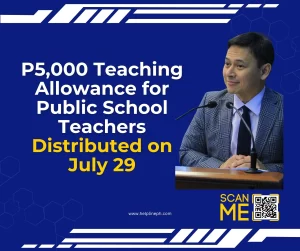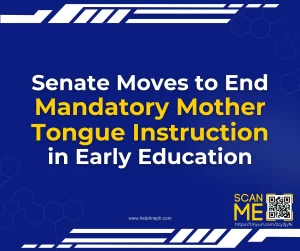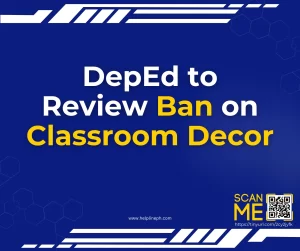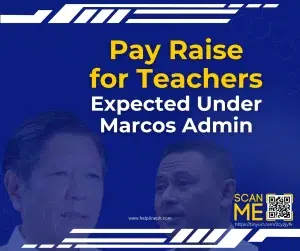Policy Guidelines on Awards and Recognition for K12 Program
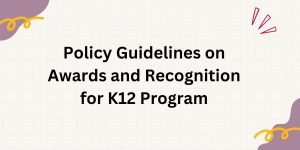
In line with the implementation of Republic Act No. 10533, otherwise known as Enhanced basic Education Act of 2013 (K to 12 Lan›), the Department of Education (DepEd) is adopting the enclosed Policy Guidelines on Awards and Recognition for the K to 12 Basic Education Program.
These awards have been designed to formally recognize the outstanding performance and achievement of learners in academics, leadership, and social responsibility, among other aspects of student progress and development. These awards are given to encourage learners to strive for excellence and to become proactive members of the school and community.
All learners, including transferees, who have met the standards, criteria, and guidelines set by this policy shall be recognized.
There can be two or more recipients of any award. However, should there be no qualified learners, awards shall not be given.
For learners in the Special Education (SpEd) program who follow the K to 12 Curriculum, the same policy guidelines shall apply. Learners using a modified curriculum may receive recognition in the class based on their performance in meeting the standards of their curriculum.
Effective School Year 2016-2017, the Policy Guidelines on Awards and Recognition for the K to 12 Basic Education Program shall be implemented in public elementary and secondary schools, including Grade 6 classes under the old Basic Education Curriculum (BEC).
Private schools, higher education institutions (HEIs), technical-vocational institutions (TVIs), state universities and colleges (SUCs), and local universities and colleges (LUCs) offering basic education or any grade levels thereof, shall be responsible for promulgating their policy guidelines on awards and recognition for the K to 12 Basic Education Program, consistent with these policies and guidelines. Any modifications to the guidelines should be subject to the approval of the DepEd Regional Office.
These guidelines will remain in force and in effect for the duration of the program, unless sooner repealed, amended, or rescinded. All provisions in existing Orders and Memoranda which are inconsistent with this Order are rescinded.
I. What awards do we give?
A. Classroom Awards are recognition given to learners in each class or section. A simple recognition may be given per quarter, semester, or at the end of the school year. Awardees are given merit by the adviser and/or other subject teachers in recognition of the learners’ outstanding performance in class.
1. Performance Awards for Kindergarten
Learners in Kindergarten should be recognized for their most evident and most prominent abilities. They can also be recognized for showing significant improvement in a specific area (e.g., from having poor fine-motor skills to being able to draw or write well). Since kindergarten learners have no numerical grades, teachers are advised to recognize outstanding achievement of learners based on the different domains and/or learning competencies of the kindergarten curriculum at the end of every quarter.
2. Conduct Awards
These awards are given to learners who have been observed to consistently demonstrate the DepEd core values (Maka-Diyos, Makatao, Makakalikasan, Makabansa).
3. Academic Excellence Award
The Award for Academic Excellence within the quarter is given to learners from grades 1 to 12 who have attained an average of at least 90 and passed all learning areas.
The Average Grade per Quarter is reported as a whole number following DepEd Order No. 8, s. 2015.
Table 1 shows the specific Academic Excellence Award given to learners who meet the following cut-off grades.
Table 1. Academic Excellence Award
| Academic Excellence Award | Average Grade per Quarter |
| 1. With Highest Honors/May Pinakamataas
na Karangalan |
98–100 |
| 2. With High Honors/May Mataas na
Karangalan |
95–97 |
| 3. With Honors/May Karangalan | 90–94 |
4. Recognition for Perfect Attendance
This award is given at the end of every quarter to encourage learners to attend and actively participate in class. Perfect attendance means that a learner must be present in all of his/her classes, and must have no absencesfor the entire quarter. Learners who arerepresenting the school for various purposes (e.g., in-school or off- campus activities) may also qualify for this award.
B. Grade-level Awards are given to qualified learners for every grade level at the end of the school year. Candidates for the awards are deliberated by the Awards Committee (AC) if they have met the given criteria.
1. Academic Excellence Award
At the end of the school year, the Academic Excellence Award is given to learners from grades 1 to 12 who have attained a General Average of at least 90 anda passing Final Grade in all learning areas.
The General Average is reported as a whole number following DepEd Order No. 8, s. 2015.
The class advisers will give to the AC the list of qualified learners to be awarded during a school ceremony. Refer to Table 2 for the Academic Excellence Award at the end of the school year.
Table 2. Academic Excellence Award
| Academic Excellence Award | General Average |
| 1. With Highest Honors/May Pinakamataas
na Karangalan |
98–100 |
| 2. With High Honors/May Mataas na
Karangalan |
95–97 |
| 3. With Honors/May Karangalan | 90–94 |
2. Leadership Award
The leadership award is given to learners in grades 6, 10, and 12 who have demonstrated exemplary skills in motivating others and organizing projects that have significantly contributed to the betterment of the school and/or community. This award is given during the completion or graduation ceremony.
To qualify for this award, a learner must:
- Have no failing grades in any of the learning
- Have not committed any offense punishable by suspension or higher sanction according to the Department’s service manual and child protection policies in the current school
- Be a class officer or an active member/officer of any recognized school club, team, or
Table 3. Criteria for Leadership Award
| Criteria | Weight | |
| Advisers | Peers | |
| 1. Motivational Skills (40%)
a. Communicates effectively b. Shows initiative and responsibility c. Engages group and/or club mates to participate actively d. Establishes collaborative relationships e. Resolves conflicts |
24% |
16% |
| 2. Planning and Organizational Skills (40%)
a. Plans and designs relevant activities for the class, club and/or school b. Implements planned activities effectively and efficiently c. Monitors implementation of plans and tasks d. Manages and/or uses resources wisely |
24% |
16% |
| 3. Contribution to the School and/or Community (20%)
Renders service and/or implements activities relevant to the school population and/or community |
12% |
8% |
| Total | 60% | 40% |
3. Award for Outstanding Performance in Specific Disciplines
These awards are given to recognize learners in grades 6, 10, and 12 who have exhibited exemplary skills and achievement in specific disciplines. These disciplines are Athletics, Arts, Communication Arts, Mathematics and Science, Social Sciences, and Technical-Vocational Education (Tech-Voc). These awards also value the learner’s achievement in a specific discipline that has contributed to the school and/or community. Table 4 on page 7 specifies the criteria and weights for these awards.
There may be more than one category of awards under the following disciplines: Athletics, Arts, Communication Arts, and Tech-Voc. There will be no separate awards for special programs.
4. Award for Work Immersion
Award for Work Immersion is specific to Senior High School (SHS) tracks. This award may be given to grade 12 graduating students who have exemplified outstanding performance based on the terms of reference or engagement set by the school and evaluation of the direct supervisor and subject teacher. The awardee(s) must have received high efficiency rating for their diligence and consistency in performing their duties and responsibilities throughout the immersion program.
Only those learners who have received an outstanding academic rating in the Work Immersion subject (at least 90%) shall be awarded. This rating in the report card consists of the learner’s performance and/or output during the Work Immersion.
5. Award for Research or Innovation
Award for Research or Innovation is specific to the SHS tracks. Grade 12 graduating students—individuals, pairs, or groups of not more than four members—must have led the planning and execution of a research or innovation to advance the potential applications of technology, or research whose findings can be used to drive better efficiency and productivity as well as to improve the lives of the people in the school and/or community.
6. Award for Club or Organization Achievement
This award is given to a duly recognized club or organization that has created positive impact on the school and/or community it serves through the implementation of all its planned projects and activities, provided strong support to the implementation of the school activities and attainment of the school’s objectives, and taken great strides to help its members develop their potentials.
B. Special Recognition is given by the school to the learners who have represented and/or won in competitions at the district, division, regional, national, or international levels. This is to publicly affirm learners who have brought honor to the school.
II. What do awardees receive?

The grade-level awardees shall receive certificates, medals, and/or plaques from the school, bearing the official seal of the Department (DepEd Order No. 63, s.2011). Schools are required to follow the specifications to ensure the quality of awards, certificates, and medals and uphold the prestige of the awards.
Certificates indicating the specific awards shall be given to all awardees. It is important to note that in the preparation of certificates, attention to proportion and detail is important. The date and venue of the school ceremony should also be complete and accurate.
Table 8 shows the medal specifications for each of the awards.
Table 8. Medal and plaque specifications
| Award | Technical Specifications | |
| 1. Academic Excellence Award
a. With highest honors |
Gold |
Medal with DepEd seal Diameter Size: 6cm
Weight: 30g |
| b. With high honors | Silver | Ribbon width: 1 inch
Ribbon color: depending on |
| region | ||
| c. With honors | Bronze | |
| Award | Technical Specifications | |
|
2. Award for Leadership |
Gold |
Medal with DepEd seal Diameter Size: 6cm Weight: 30g
Ribbon width: 1 inch Ribbon color: gold |
| 3. Award for Work Immersion | Gold | Medal with DepEd seal Diameter Size: 5cm Weight: 25g
Ribbon width: 1 inch Ribbon color: depending on region |
| 4. Award for Research/Innovation | Gold | |
| 5. Award for Outstanding Performance in
the specific learning areas |
Gold | |
| 6. Award for Club or Organization Achievement (members from different
grade levels) |
Plaque for the club/organization Certificate for each member with
school logo |
|
To facilitate compliance with these guidelines, schools must coordinate with external sponsors, donors, and partners regarding the awards they wish to give the school.
Awards must have specific rubrics prepared or adapted by the AC at the school level, based on the given qualifications and indicators.
III. How do schools determine awardees?
An Awards Committee (AC) shall be organized by the school head or principal in every school for each grade level at the beginning of the school year. For small schools, only one (1) AC shall be organized. The committee must be composed of at least three (3) members from the teaching staff, guidance counselor or designated teacher. The total count of committee members should be an odd number. The chairperson of the AC could be any of the teachers, department head, grade-level chairperson, or curriculum head. No member of the AC must be related within the second degree of consanguinity or affinity to any of the candidates for awards.
The AC shall:
- Establish the processes of and timelines in accepting nominations and determining qualifiers for grade level
- Formulate rubrics specific to the grade level
- Communicate to the school community, parents, and other stakeholders the processes involved in giving
- Verify the authenticity of documents
- Deliberate on the qualifications of the candidates for the awards based on the rubrics and the documents
- Recommend to the school head or principal the result of evaluation for approval.
- Communicate to the school community, parents, and other stakeholders involved in the results of the
- Recommend to the school head or principal the resolution on any related issue that may arise from the results of the
- Ensure that guidelines stipulated in this policy are
IV. When to file and settle protests?
Cases of protest shall be filed by the candidate with his/her parent or guardian to the School Head within three (3) working days from the announcement and shall be decided on by the school head or principal, considering the recommendations of the AC within three (3) working days from filing.
